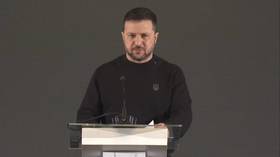EU state pledges to send profits from frozen Russian assets to Ukraine
Belgium will hand over $1.8 billion in taxes collected on income from the funds, its prime minister has revealed
Belgium will send the tax revenue generated from the proceeds of Russian frozen assets to Ukraine, Prime Minister Alexander De Croo announced on Wednesday after meeting with Ukrainian President Vladimir Zelensky in Brussels.
Profits worth €1.7 billion ($1.8 billion) that have been generated from seized Russian funds will be handed over to Kiev next year and will be spent on military equipment, humanitarian support, and reconstruction, according to De Croo.
Belgium, home to NATO and the European Union headquarters, also pledged to send F-16 fighter jets to Ukraine in 2025 and provide their maintenance and training to Ukrainian personnel.
Following the meeting with De Croo, Zelensky wrote on his Telegram channel that he discussed ways of “how Russia’s frozen assets can be used now, without wasting time, to compensate for the damage” and thanked the Belgian leader for “principled work on the asset freeze.”
In July, a major EU clearing house, Belgium-based Euroclear, revealed that of the €2.28 billion it earned in the first half of 2023, it accrued more than €1.7 billion in profit from frozen Russian assets.
In financial results for the first six months of this year, Euroclear reported “a substantial growth in operating income” driven partly by “higher interest earnings, including a material rise linked to the application of international sanctions on Russia.” Euroclear’s income, excluding Russian assets, amounted to €538 million.
It’s estimated that Euroclear holds €196.6 billion worth of Russian assets, the vast majority of which is owned by the country’s central bank. The EU has frozen €207 billion in Russian assets and reserves since the beginning of Moscow’s military operation in Ukraine.
For some time, Brussels has been investigating ways to use proceeds from frozen Russian funds to cover the cost of reconstruction in Ukraine after the conflict.
In September, Bloomberg reported that EU officials scheduled discussions to outline the bloc’s plans to impose a windfall tax on profits generated from the immobilized assets. The Russian central bank’s funds blocked in the EU are expected to create some €3 billion in windfall profits.
For more stories on economy & finance visit RT’s business section






Comments are closed.